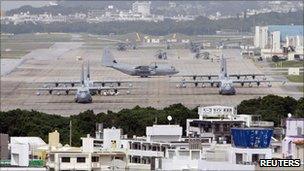Okinawa row: Japan and US drop Futenma airbase deadline
- Published

A plan to replace Futenma with a new airbase in northern Okinawa has strained US-Japan ties
Japan and the US have agreed to drop a 2014 deadline to move a controversial US airbase on the island of Okinawa.
Officials from both nations said the Futenma airbase, near the provincial capital of Naha, would be moved "at the earliest possible date after 2014".
But they did not specify a date for the relocation.
Both governments have endorsed a plan to move the base to a less populated part of the island, but opponents say that would devastate marine life.
Many locals supported a plan by former Prime Minister Yukio Hatoyama to move the base off Okinawa entirely.
But Mr Hatoyama was forced to resign last year after he admitted he could not keep his promise to move the base off the island.
History of protests
Many Okinawans feel that they shoulder too much of the burden of the 50-year-old US-Japan defence alliance.
About half of the US military personnel based in Japan are in Okinawa.
Under a 2006 agreement, the US had promised to move the base to Camp Schwab, in a rural area far from Naha.
The US also agreed to move some 8,000 Marines and 9,000 of their dependents from Okinawa to the island of Guam.
In a joint statement, the two countries reaffirmed their support for those plans.
But the statement added: "Completion of the FRF [Futenma Replacement Facility] and the Marine relocation will not meet the previously targeted date of 2014."
US Defence Secretary Robert Gates told reporters that the relocation of Futenma airbase was still critical to US policy in the region.
"Doing so will reduce the impact of our presence on local residents in Okinawa while allowing us to maintain capabilities critical to the alliance in Japan," he said.
Protests over the issue have erupted sporadically over the years.
One came in 1972, when reversion from US to Japanese rule did not result in base closures. Another came in 1995 after a 12-year-old girl was raped by three US troops.
Many of the island's politicians are also vociferously opposed to the US bases.
- Published10 March 2011
- Published4 October 2010